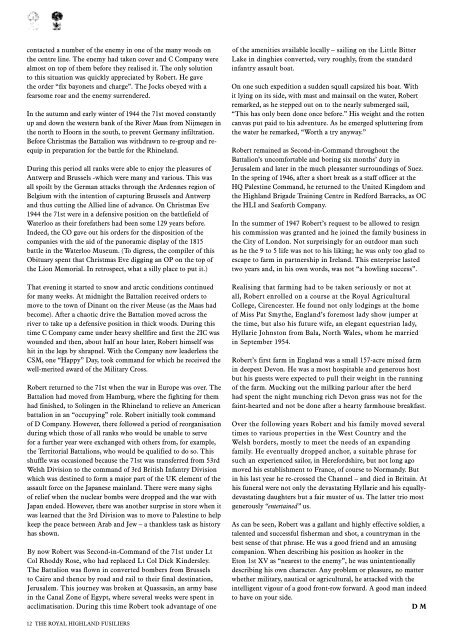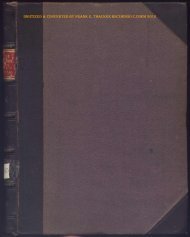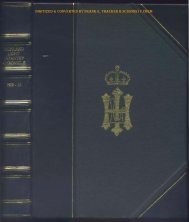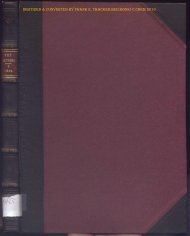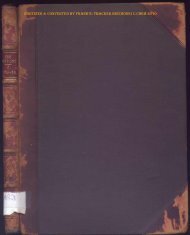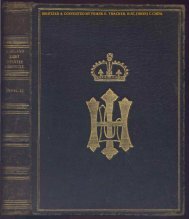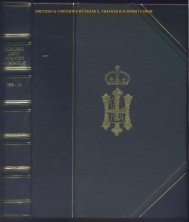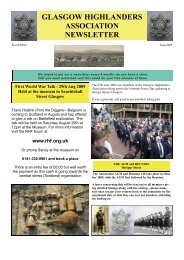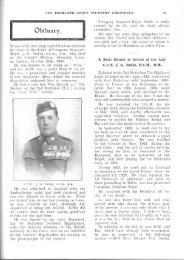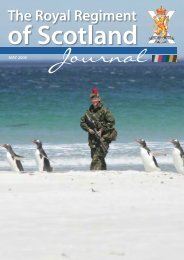Journal 2008 - The Journal Royal Highland Fusiliers - The Royal ...
Journal 2008 - The Journal Royal Highland Fusiliers - The Royal ...
Journal 2008 - The Journal Royal Highland Fusiliers - The Royal ...
Create successful ePaper yourself
Turn your PDF publications into a flip-book with our unique Google optimized e-Paper software.
contacted a number of the enemy in one of the many woods onthe centre line. <strong>The</strong> enemy had taken cover and C Company werealmost on top of them before they realised it. <strong>The</strong> only solutionto this situation was quickly appreciated by Robert. He gavethe order “fix bayonets and charge”. <strong>The</strong> Jocks obeyed with afearsome roar and the enemy surrendered.In the autumn and early winter of 1944 the 71st moved constantlyup and down the western bank of the River Maas from Nijmegen inthe north to Hoorn in the south, to prevent Germany infiltration.Before Christmas the Battalion was withdrawn to re-group and reequipin preparation for the battle for the Rhineland.During this period all ranks were able to enjoy the pleasures ofAntwerp and Brussels -which were many and various. This wasall spoilt by the German attacks through the Ardennes region ofBelgium with the intention of capturing Brussels and Antwerpand thus cutting the Allied line of advance. On Christmas Eve1944 the 71st were in a defensive position on the battlefield ofWaterloo as their forefathers had been some 129 years before.Indeed, the CO gave out his orders for the disposition of thecompanies with the aid of the panoramic display of the 1815battle in the Waterloo Museum. (To digress, the compiler of thisObituary spent that Christmas Eve digging an OP on the top ofthe Lion Memorial. In retrospect, what a silly place to put it.)That evening it started to snow and arctic conditions continuedfor many weeks. At midnight the Battalion received orders tomove to the town of Dinant on the river Meuse (as the Maas hadbecome). After a chaotic drive the Battalion moved across theriver to take up a defensive position in thick woods. During thistime C Company came under heavy shellfire and first the 2IC waswounded and then, about half an hour later, Robert himself washit in the legs by shrapnel. With the Company now leaderless theCSM, one “Happy” Day, took command for which he received thewell-merited award of the Military Cross.Robert returned to the 71st when the war in Europe was over. <strong>The</strong>Battalion had moved from Hamburg, where the fighting for themhad finished, to Solingen in the Rhineland to relieve an Americanbattalion in an “occupying” role. Robert initially took commandof D Company. However, there followed a period of reorganisationduring which those of all ranks who would be unable to servefor a further year were exchanged with others from, for example,the Territorial Battalions, who would be qualified to do so. Thisshuffle was occasioned because the 71st was transferred from 53rdWelsh Division to the command of 3rd British Infantry Divisionwhich was destined to form a major part of the UK element of theassault force on the Japanese mainland. <strong>The</strong>re were many sighsof relief when the nuclear bombs were dropped and the war withJapan ended. However, there was another surprise in store when itwas learned that the 3rd Division was to move to Palestine to helpkeep the peace between Arab and Jew – a thankless task as historyhas shown.By now Robert was Second-in-Command of the 71st under LtCol Rhoddy Rose, who had replaced Lt Col Dick Kindersley.<strong>The</strong> Battalion was flown in converted bombers from Brusselsto Cairo and thence by road and rail to their final destination,Jerusalem. This journey was broken at Quassasin, an army basein the Canal Zone of Egypt, where several weeks were spent inacclimatisation. During this time Robert took advantage of oneof the amenities available locally – sailing on the Little BitterLake in dinghies converted, very roughly, from the standardinfantry assault boat.On one such expedition a sudden squall capsized his boat. Withit lying on its side, with mast and mainsail on the water, Robertremarked, as he stepped out on to the nearly submerged sail,“This has only been done once before.” His weight and the rottencanvas put paid to his adventure. As he emerged spluttering fromthe water he remarked, “Worth a try anyway.”Robert remained as Second-in-Command throughout theBattalion’s uncomfortable and boring six months’ duty inJerusalem and later in the much pleasanter surroundings of Suez.In the spring of 1946, after a short break as a staff officer at theHQ Palestine Command, he returned to the United Kingdom andthe <strong>Highland</strong> Brigade Training Centre in Redford Barracks, as OCthe HLI and Seaforth Company.In the summer of 1947 Robert’s request to be allowed to resignhis commission was granted and he joined the family business inthe City of London. Not surprisingly for an outdoor man suchas he the 9 to 5 life was not to his liking; he was only too glad toescape to farm in partnership in Ireland. This enterprise lastedtwo years and, in his own words, was not “a howling success”.Realising that farming had to be taken seriously or not atall, Robert enrolled on a course at the <strong>Royal</strong> AgriculturalCollege, Cirencester. He found not only lodgings at the homeof Miss Pat Smythe, England’s foremost lady show jumper atthe time, but also his future wife, an elegant equestrian lady,Hyllarie Johnston from Bala, North Wales, whom he marriedin September 1954.Robert’s first farm in England was a small 157-acre mixed farmin deepest Devon. He was a most hospitable and generous hostbut his guests were expected to pull their weight in the runningof the farm. Mucking out the milking parlour after the herdhad spent the night munching rich Devon grass was not for thefaint-hearted and not be done after a hearty farmhouse breakfast.Over the following years Robert and his family moved severaltimes to various properties in the West Country and theWelsh borders, mostly to meet the needs of an expandingfamily. He eventually dropped anchor, a suitable phrase forsuch an experienced sailor, in Herefordshire, but not long agomoved his establishment to France, of course to Normandy. Butin his last year he re-crossed the Channel – and died in Britain. Athis funeral were not only the devastating Hyllarie and his equallydevastatingdaughters but a fair muster of us. <strong>The</strong> latter trio mostgenerously “entertained” us.As can be seen, Robert was a gallant and highly effective soldier, atalented and successful fisherman and shot, a countryman in thebest sense of that phrase. He was a good friend and an amusingcompanion. When describing his position as hooker in theEton 1st XV as “nearest to the enemy”, he was unintentionallydescribing his own character. Any problem or pleasure, no matterwhether military, nautical or agricultural, he attacked with theintelligent vigour of a good front-row forward. A good man indeedto have on your side.D M12 THE ROYAL HIGHLAND FUSILIERS


